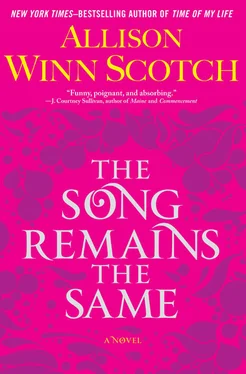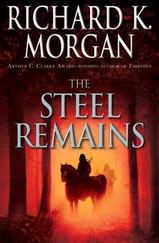My husband. I wasn’t quite used to him, to the idea of him, but still, if my younger self loved him, I’d find a way to do the same.
He squinted his face to remember my favorite flowers. “What are they called? Oh. Hyacinths. Something about their fragrance. Reminded you of being a kid. I’ll track some down and bring them tomorrow—maybe that will help.”
“Maybe that will,” I said, and we both looked at the other with a hopefulness that hyacinths might actually be the answer to this.
When everyone finally leaves me alone, I sleep and try to remember, but there’s nothing there, nothing to remember, and after a while, it feels like I’m trying to use a limb that’s not connected to me. What’s that phenomenon? A phantom. Yes, that’s exactly what it is. How can I flex my foot if it’s not attached? How can I curl my fingers into my palm if my brain has no way to send the message?
Mostly, I zone out at Jamie Reardon—that reporter from the local news who now covers the story for the one national cable station the hospital receives. He reminds me of someone whom I can’t recall, but the reminder is comfort enough. Like he could be my confidant, an old high school love, a brother. He looks sturdy, reliable, and though he’s just a projection on the screen, I already feel like we are friends.
Sometimes, Anderson comes by, and we sit—strangers but not really strangers—and watch Jamie in silence as he transmits the details of the crash, of our recovery, to the world that gobbles them up. We confer over our mutual gratefulness to have survived, leaving the murkier details—the guilt, the families of those who didn’t, the enormity of the questions like Why us? —untouched. To be alive is enough for now, and when it’s not, Jamie Reardon fills in the quiet spaces that are too difficult to consider if we allowed for them anyway.
On day five back into the waking world, Dr. Macht, my mother, and Peter weave their way into my room. My mom instinctively reaches for the remote, zapping the white noise.
“Nell, we need to tell you something,” the doctor says, with Peter shadowing his shoulder, looking like he might fall apart at any second. Without his baseball cap, he looks fifteen years older—the circles under his eyes the color of dark bruises, the pallor of his cheeks near-dead.
“I know that you can’t remember this.” Dr. Macht hesitates, but then puts on his best doctor voice and continues. “But it’s important that you know that you were pregnant.”
I feel my eyelashes flutter.
“Unfortunately, with all the damage your body sustained, that pregnancy is no longer viable.” He hesitates. “Actually, you miscarried when you first came in. We needed to wait until you were stable to tell you.”
Peter starts weeping behind him, and I wish, in a way, that I could, too. Wish that I could feel the loss of this as tangibly as he does. Something akin to a wad of emotion forms in my throat but it’s easily swallowed.
“How far along was I?”
“Relatively early into the pregnancy—it appears well within the first trimester, maybe eight weeks or so. We have a call in to your insurance company to track down your New York obstetrician, maybe get some answers from her.” He glances toward Peter. “I’ll give you two some privacy to digest this.”
He shuts the door and leaves Peter and me in a vacuum of silence, barring Peter’s unsuccessful attempts to clamp down his emotion.
“I’m sorry,” I say. “I know that this whole thing is hard on you. Were we trying for long?”
“No,” he says quietly. “It was a surprise.”
I nod and stare out the window. Everything to me is a surprise.
“I know that this sounds weird for me to tell you, and I don’t mean it rudely, but it feels strange to be discussing this with you,” I say. “Not that I’m not sure that we didn’t have a great life together, it’s just…you know…I don’t remember where we lived or us having sex or trying for a baby. Any of that.”
His face looks like he mistakenly swallowed vodka when he meant for water.
“I’ll tell you what,” he says, when he’s pieced himself back together—I watch him, forcibly trying to do so, stitch himself back up so he doesn’t totally come undone right here in my hospital room. He leans down to kiss my forehead, and I breathe deeply and try to recognize a familiar scent. “Get some rest. And when you’re ready—tomorrow, the next day, the day after that—I’ll sit down and tell you our story.”
Our story, I think, after he goes, and I’ve flipped the volume back up on the television. Yes, that sounds nice. Everyone, after all, has a story.
T here is good news and bad news on day seven. The bad news is that Anderson is being transferred to a rehab clinic.
When he comes to offer his good-byes, I ease out of bed, slowly, delicately, self-conscious in my hospital gown, and embrace him the best that we can—with my bruised ribs and his wheelchair-folded body. He smiles the smile that likely made him a star. It’s magnetic, infectious, damn near hypnotizing. I’ve read his section of the People article, though, seen the clips on Access Hollywood. I know that he has spent the past few years bedding too many women for him to remember their names, being chastised for showing up drunk more than once on set. I know that he is immensely talented but that he is his own worst enemy: torpedoing a career that could be taken to a grander scale if he would only stop doing it in. I know all this, and so I both trust him and am wary. That smile. That goddamn smile is so absorbing that I want to hurl myself onto his wheelchair and bus to rehab with him, and yet, I suspect that I am just one of many women to feel this way.
And also, of course, there is Peter. And my marriage. And my life before this. I feel myself blushing at my idiocy, at the fantasy of escaping this life with Anderson, even though there’s nothing—and yet everything—to escape from. Samantha wished that she was twenty-one again, but I don’t have twenty-one to wish for. I only have something else—make-believe—to dream of.
“Give everyone else a chance,” Anderson says kindly, though not particularly like he wants me to hurl myself on his wheelchair and run with him, though not particularly like he doesn’t, either. More like confidants, which I suppose we’ve become. “Take it day by day. That’s the only way to deal.”
“You’ve been in therapy, haven’t you?” I center myself, my thoughts, pulling back into the real world, into this, into the moment. “The shrink who comes by here every day keeps telling me the same thing.”
“Years,” he laughs. “More years of therapy than anyone has the right to. Started at sixteen—my parents forced me when they heard I was doing whippets every day after school.”
“What screwed you up?” I am prolonging it now, his exit.
“Nothing screwed me up,” he says. “That’s the joke of it now. Nothing at all screwed me up—I had a perfectly decent childhood, perfectly wonderful parents. My dad is a dentist. I don’t know…I just was. Screwed up”—he pauses—“though now I need therapy for entirely different reasons. The nightmares, all of that.”
“In some ways, maybe it’s better that I don’t remember.”
“Catch-22,” he says.
Neither of us knows quite how you say good-bye to the former stranger with whom you fell from the sky, so he hands me the new issue of People —we’ve been bumped from the headline to the corner cover story—and promises to e-mail or call as soon as he settles in.
I’m glancing through the Star Tracks section of the magazine, when Rory and Dr. Macht, in blue surgery scrubs and a white lab coat, wander in. They are armed with the good news of the day.
Читать дальше












